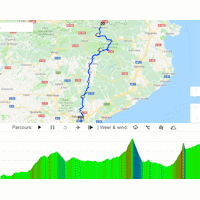Volta a Catalunya 2019 Route stage 3: Sant Feliu de Guíxols – Vallter 2000
 Wednesday 27 March - The 3rd stage of the Volta a Catalunya is a mountain race of 179 kilometres between Sant Feliu de Guíxols and ski resort Vallter 2000. The ultimate climb amounts to 12 kilometres, while the average gradient sits at 7.3%.
Wednesday 27 March - The 3rd stage of the Volta a Catalunya is a mountain race of 179 kilometres between Sant Feliu de Guíxols and ski resort Vallter 2000. The ultimate climb amounts to 12 kilometres, while the average gradient sits at 7.3%.
Originally, Vallter was scheduled as a finish for the 2018 Volta a Catalunya, but due to harsh weather in the north of Spain the race was shortened at the eleventh hour in favour of a false flat arrival in Camprodon. Thomas De Gendt soloed to victory ahead of Simon Yates and Thibaut Pinot, while the most recent winners in Vallter 2000 are Tejay van Garderen (2014) and Nairo Quintana (2013).
The 2019 race to Vallter opens on rolling roads. At 3.5 kilometres and with shallow gradients, the Alt de la Ganga serves as a perfect place to stretch the legs before the route continues to the Alt de Oix. The 7.7 kilometres climb appears after 120 kilometres. The average gradient is 5.2%, but this is a biased statistic as the road levels out before the summit.
The end of the descent coincides with the start of the penultimate climb, Alt de Rocabruna: 7.3 kilometres at 5.8%. No downhill after its crest, as the route continues false flat to the first uphill stretches of the closing climb. Basically, this is a pepped up false flat, which slopes at 3% for 9 kilometres.
The final haul up to Vallter 2000 amounts to 11.2 kilometres and the average gradient is 7.6%. The steepest ramps are 14%.
The first three riders on the line win time bonuses of 10, 6 and 4 seconds, while two intermediate sprints (at kilometre 65 and at kilometre 159) come with 3, 2 and 1 seconds each.
Another interesting read: race results 3rd stage 2019 Volta a Catalunya.
Volta a Catalunya 2019 stage 3: route, profile, more
Click on the images to zoom
Watch the highlights of recent races here:
Related articles Favourites - Volta a Catalunya 2019 Overview - Volta a Catalunya 2019 Formolo wins exciting final race, López takes GC - Volta a Catalunya 2019 Matthews bests Bauhaus in photo finish, López still leader - Volta a Catalunya 2019 Schachmann solos to victory, López retains lead - Volta a Catalunya 2019 New leader López wins in la Molina - Volta a Catalunya 2019 Power victory Matthews, De Gendt retains lead - Volta a Catalunya 2019 De Gendt wins 1st stage solo - Volta a Catalunya 2019 Route stage 1: Calella – Calella - Volta a Catalunya 2019 Route stage 2: Mataró – Sant Feliu de Guíxols - Volta a Catalunya 2019 Route stage 4: Llanars (Vall de Camprodon) – La Molina - Volta a Catalunya 2019 Route stage 5: Puigcerdà – Sant Cugat del Vallès - Volta a Catalunya 2019 Route stage 6: Valls – Vila-seca - Volta a Catalunya 2019 Route stage 7: Barcelona – Barcelona - Volta a Catalunya 2019 More articles La Flèche Wallonne Femmes 2024: Niewiadoma rules at the Wall of Huy
Tour of the Alps 2024: Solo triumph and leader's jersey for Juan Pedro López
La Flèche Wallonne 2024: The Route
La Flèche Wallonne 2024: Riders
La Flèche Wallonne Femmes 2024: The Route
La Flèche Wallonne Femmes 2024: Riders
Tour of the Alps 2024 Route stage 3: Schwaz - Schwaz
Tour of the Alps 2024: Riders
Tour of the Alps 2024 Route stage 4: Laives – Borgo Valsugana
Tour of the Alps 2024 Route stage 5: Levico Terme - Levico Terme
Liège-Bastogne-Liège 2024: The Route
Liège-Bastogne-Liège 2024: Riders
Cycling Calendar 2024
Giro 2024: The Route
Giro 2024: Riders
Giro 2024 Route stage 1: Turin - Turin
Giro 2024 Route stage 2: San Fransesco al Campo - Oropa
Giro 2024 Route stage 8: Spoleto - Prati di Tivo
Giro 2024 Route stage 10: Pompei - Bocca della Selva
Giro 2024 Route stage 11: Foiano di Val Fortore - Francavilla al Mare
Giro 2024 Route stage 15: Manerba del Garda - Livigno
Giro 2024 Route stage 16: Livigno - Monte Pana
Giro 2024 Route stage 17: Selva di Val Gardena – Passo Brocon
Giro 2024 Route stage 19: Mortegliano - Sappada
Giro 2024 Route stage 20: Alpago – Bassano del Grappa
Tour de France 2024: The Route
Tour de France 2024: Riders
Tour de France 2024 Route stage 1: Florence - Rimini
Vuelta 2024: The Route
Like our Facebook page and stay on top of all pro-race information!



